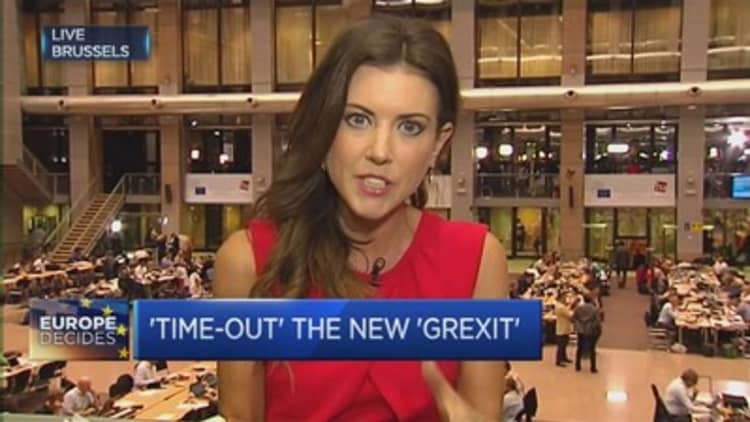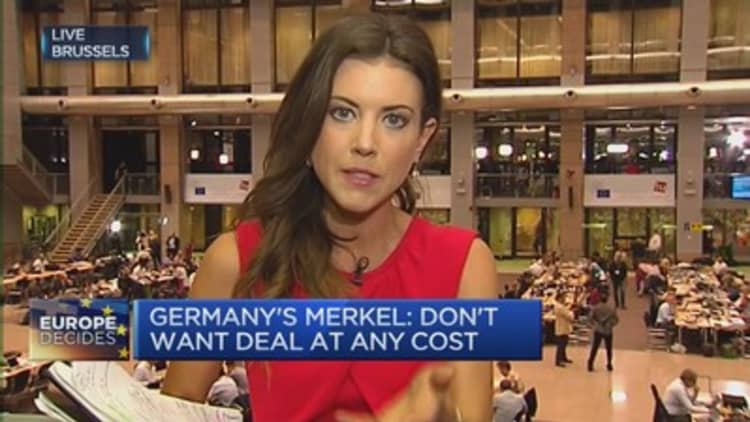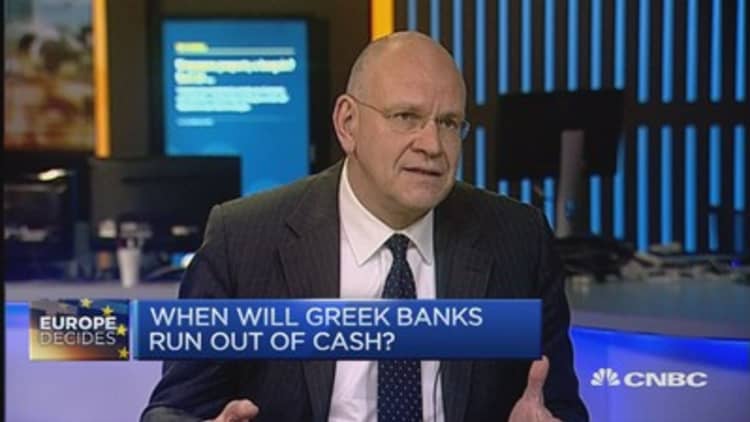


Greece still has more to prove before it can restore the trust of its fellow euro zone countries and get funds it desperately needs to stave off calamity, with euro zone officials telling CNBC on Sunday the country will need far more money than originally believed.
Since it first fell into dire economic straits in 2010, Greece has already been bailed out to the tune of 240 billion euros ($267 billion), and last week asked for an additional 53.5 billion euros. However, euro zone sources told CNBC they estimate that Greece will need a further 82 billion-86 billion euros.
In spite of winning an anti-austerity mandate in a referendum last weekend, Greece's left-wing prime minister, Alexis Tsipras will have to push through legislation for sweeping cuts and reforms through parliament by July 15.
The reforms and tax measures—including a broader range of goods to be covered by a 23 per cent sales tax— are harsher than the ones the Greek people so vehemently rejected last weekend. Only once the legislation is passed will the other 18 member countries of the euro zone agree to release money and start negotiations for a third bailout.
After failing to reach an agreement on the terms for granting Greece more money following talks Saturday and Sunday, the Eurogroup of finance ministers have presented a proposal document for discussion for the leaders of the euro zone.
The onus is now squarely upon the Hellenic Republic to thrash out a deal, which some euro zone leaders hope will happen despite the odds—and tense, marathon negotiations.
"I don't want to look back in 10 years' time and have a situation whereby this could've been saved but it wasn't," Irish Taoiseach (prime minister) Enda Kenny told CNBC.
Franco-German split?
Valdis Dombrovskis, European Commissioner for the Euro and Social Dialogue, told CNBC that there was still a lot of work to do.
"Well, of course not to pre-judge the discussions of the leaders, but in any case it was quite clear a position from the Eurogroup what needs to be done in terms of prior actions," Dombrovskis said.
Those needs include "what kind of legislation needs to be done, what needs to be prepared before the negotiations start and also, during the negotiations to ensure that this program can be a successful program."
Additionally, he said, "there's also a lot of emphasis on rebuilding trust between Greece and other euro zone countries, and strict focus on implementation."
This evening's negotiations will be fraught, thanks to a split among leaders. On one side are austerity hardliners such Germany's Chancellor Angela Merkel, who will be demanding tough fiscal guarantees from Greece.
On the other, French President Francois Hollande feels everything must be done to ensure the euro zone does not break apart and markets start to pick off other weaker countries.
"There is no possibility of a temporary Grexit," Hollande told reporters as he entered the negotiating room. "France will do everything to find a Greek deal tonight."
Read MoreGreece's 'game theory meets harsh reality': Ross
Germany however, struck a much tougher tone, reflecting the shock and anger Greece's surprise referendum sparked across European capitals.
"The most important currency has been lost: that is trust and reliability," said German Chancellor Angela Merkel, according to the Associated Press.
"There will not be an agreement at all costs. Nerves are tense," she added.
Germany is so wary of Athens' ability to implement much-needed reforms that the country's finance minister, Wolfgang Schaeuble, put a "timeout" clause in the Eurogroup proposal document. This would mean that if there was no agreement, Greece would be out of the euro zone for five years until it was back on its feet and able to rejoin.
Another potential condition is placing Greek assets, as much as 50 billion euros, in some form of "escrow" account to ensure that Athens will proceed with reform.
"This is now about what type of Europe we'll have in the future, and the relative powers—and this, ultimately, is a battle between Germany and France," Erik F. Nielsen, UniCredit Global Chief Economist, wrote in a note Sunday.
"The importance of this underlying philosophical divide is illustrated by two events this past week: Germany has crossed the Rubicon for the first time and said that if a government cannot be trusted, it'll need to leave the eurozone (if temporarily)," Nielsen wrote.
"And France has found itself in the probably equally uncomfortable position of having put its trust and political capital on the line for the deeply erratic Greek government," he added.
A 'very authoritarian euro zone'
The leader of Britain's euroskeptic party, the U.K. Independence Party, Nigel Farage, says the negotiations highlight a new push for euro zone discipline from Germany.
"I think the Germans' patience has finally run out," Farage told CNBC.
"The German thinking is: 'Let's get rid of this mess,'" Farage said. Expressing what he thought Germany was thinking about other troubled peripheral euro zone economies, he added: "'let's send a message to Italy, France, Spain and Portugal that actually, if you're members of this club, you got to abide by our rules.'"
Farage added: "So this is an attempt by the German finance minister to make sure we have a very authoritarian euro zone."
--Follow us on Twitter: @CNBCWorld

